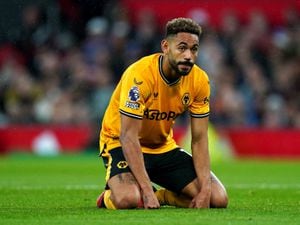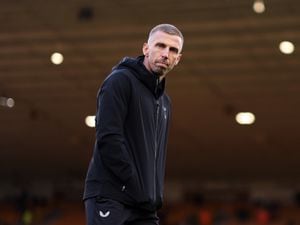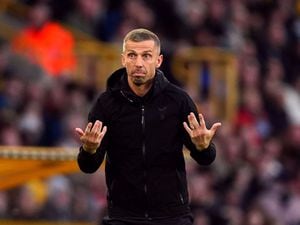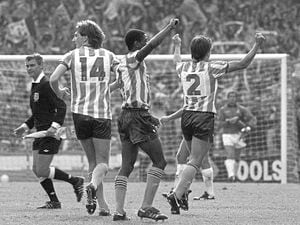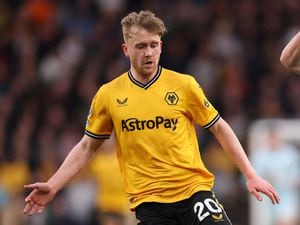Johnny Phillips: Julen Lopetegui’s arrival signals strategy shift at Wolves
Julen Lopetegui will watch on from the stands at Molineux this evening charged with lifting Wolves clear of relegation trouble.
While the appointment is designed to bring an immediate fix to the team’s travails in the Premier League, his arrival signifies the biggest change in strategy and power on and off the pitch for several seasons.
Wolves have secured a managerial heavyweight whose gravitas extends beyond the training ground.
Whereas Bruno Lage was essentially restricted to working with what was presented to him, permitted little control over recruitment and spending, Lopetegui’s arrival comes with assurances that he has influence on these matters.
The new head coach knows the profile that he wants for the first team and his stature on the continent will be of benefit to Wolves in attracting players.
Recruitment, in the main, will be facilitated by Gestifute whose own bond with Wolves has strengthened once more after an uncertain few months.
Earlier this year, Fosun signalled their intention to spread their wings beyond that trusted relationship.
When the new season kicked off, the only significant signing was Nathan Collins, whose arrival from Burnley was secured through the work of head of recruitment Matt Hobbs and technical director Scott Sellars among others.
When Wolves hosted Fulham on August 13 there was an informal meeting between Jorge Mendes and Fosun chairman Guo Guangchang.
The pair watched the match from their respective boxes in the Billy Wright Stand and discussions centred around the deals which Gestifute had been unable to conclude after a strange summer where so much appeared to hinge on the transfer of Ruben Neves.
Mendes had already waved off Sporting Lisbon’s Joao Palhinha to Fulham, unable to keep his promise to Sporting of money from Wolves for the Portuguese midfielder despite a deal being in place.
There was frustration on the part of the agent, and his lieutenant Valdir Cardoso.
Four days after those conversations at Molineux, Wolves broke their transfer record and signed Matheus Nunes from the same club.
Fosun’s decision-making at Wolves has been hard to predict in recent seasons.
It can be accused of being reactionary, where decisions are made according to the circumstances rather than aligned with serious strategic planning. That said, investment has been forthcoming even if the timing has been questionable.
Lopetegui’s arrival will change that. Since the summer of 2016 he has been attracted to, in his own words, ‘a very ambitious, very nice project’, even spending time with Fosun in advance of their purchase of Wolves to discuss plans for the 2016/17 season and beyond.
There will now be more alignment between those overseeing training on a daily basis and the ownership. Jeff Shi is entitled to feel a sense of satisfaction after his chairmanship of the club was questioned during the desperate search for a manager after Lopetegui’s initial reluctance to succeed Lage last month. Fran Garagarza’s arrival as technical advisor heralds a new structure behind the scenes, ensuring Lopetegui has his own man in the role of sporting director, even if the job title does not spell it out.
Garagarza spent a decade in that role at Eibar and, although Wolves operate on a much larger budget in a far bigger league, he is expected to provide continuity between the first team and the boardroom.
The commitment of Fosun is something which is questioned from time to time during difficult periods.
Regardless of the route the owners took to reaching this juncture from the moment Lage was sacked, it is surely an untenable position to continue to question whether Fosun has the interests of the club at heart.
That means either their own long-term commitment to Wolves or putting the club on a firm and attractive footing for investors.
It sometimes causes consternation among the hierarchy when they see suggestions that Fosun have ‘lost interest’ or ‘don’t care’.
Wolves is incredibly important and certainly occupies more of chairman Guo’s time than much larger investments within Fosun’s portfolio.
Given the geopolitical climate that the Chinese conglomerate are operating in there can never be a guarantee that the club will not be put up for sale in the future. And that day may come abruptly, who knows?
But in six-and-a-half years of ownership, the evidence overwhelmingly supports the view that Fosun has committed more to this football club than anybody could have imagined.
In today’s programme notes Shi acknowledges that replacing Lage has been a ‘painful process’.
With the club being structured as it is, some of that pain has been self-inflicted, and Shi accepts that.
However, there is also a sense that Wolves may have dodged a bullet when Michael Beale – the first candidate from the club’s own recruitment team since Paul Lambert – turned the job down at the 11th hour.
Certainly, the Queens Park Rangers head coach would have been less of a presence than Lopetegui will be on the training ground.
Fosun had kept in touch with Lopetegui since he first rejected the club in 2016.
Rather than burn bridges, as some owners may have done, they maintained a cordial relationship and it has – eventually – paid off.
The open dialogue of the past few weeks meant that, even after the latest rejection, there was always a chance of resurrecting the deal.
And this is where the now tiresome conversation regarding the Gestifute influence at Wolves arises again. There are pros and cons to this relationship, but it is hard to overlook the fact that regular communication with Lopetegui was only possible because of Mendes’s relationship with the Spaniard’s agent, Carlos Bucero.
Wolves now have a head coach in place whose calibre is proven on a European stage.
As so often before, with players previously beyond Wolves’ reach, Mendes has delivered again.
Not every arrival from the Gestifute stable has been a success, and the role of unofficial sporting directors which Mendes and Cardoso effectively occupy may appear too cosy for comfort at times, but it has reaped obvious rewards.
Lopetegui’s backroom staff have spent several days at Compton Park this week in a hands-off role, getting to know the staff and familiarising themselves with their new environment before Lopetegui arrived yesterday for a first glance of his own.
The next few weeks will see a change in dynamic on the training pitches.
The new head coach commands instant respect, will not stand for dissent from the players and has assembled a wide range of talents in the backroom alongside him. Juan Peinado has already proved himself as a first-rate assistant coach at the highest level and the same applies to fitness coach Oscar Caro.
It is expected that Lopetegui will add one more fitness coach to his staff to help with Caro’s work- load.
First-team coach Edu Rubio’s rise to the Premier League has been meteoric, just four months after accepting the job of West Ham Ladies assistant manager.
He knows Lopetegui from their time together on coaching courses and it will be fascinating to see what Rubio brings to the club, with his only other senior role coming as assistant manager at Crawley Town.
From the previous regime, Tony Roberts may continue as goalkeeper coach, but he will be working with Wales in Qatar over the coming weeks and nothing has been ratified yet.
When the full-time whistle blows tonight a new era will begin.
It would be remiss not to mention the professionalism and dignity Steve Davis brought to the post of interim manager. He returns to the academy ranks with his reputation enhanced.
On Monday, Lopetegui will be formally introduced. He will be able to enlighten us on why the time was finally right to make Molineux home for the coming seasons.
The 2022/23 Premier League campaign has been a write-off so far. Supporters now hope that this season genuinely kicks off on Boxing Day.

